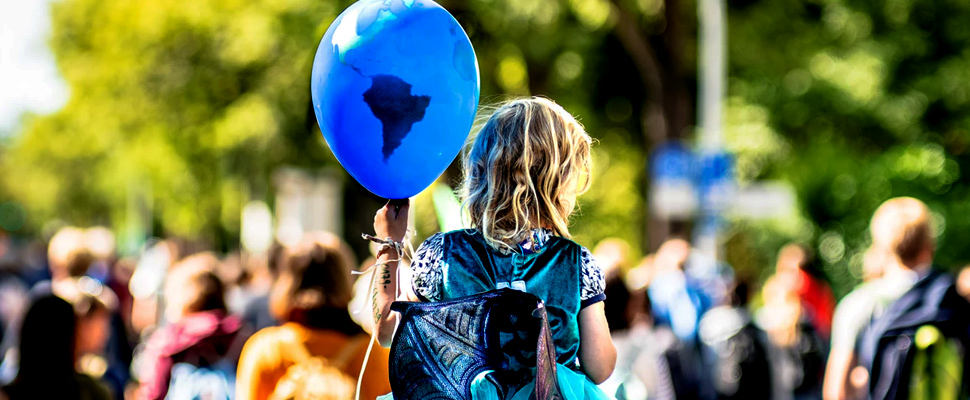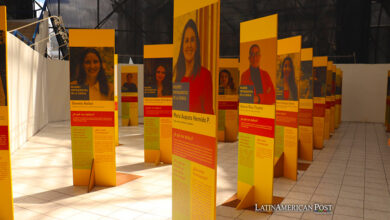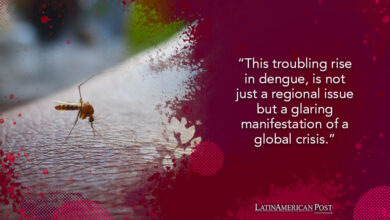Climate breakdown is increasing violence towards women
According to the “Gender-based violence and environment linkages” report, patterns of gender-based abuse are also observed across environmental contexts.

Girl holding a balloon with map drawn into it. / Photo: Unsplash – Reference image
The Woman Post | Luisa Fernanda Báez Toro
Listen to this article
Leer en español: El colapso climático está aumentando la violencia hacia las mujeres
Last week, The International Union for the Conservation of Nature (IUCN) released the biggest study on the correlation between climate breakdown and violence towards women and girls. The report includes surveys, over 80 case studies and over 1000 documents and reports collected in English, French and Spanish.
As read on the report, gender-based violence includes different expressions of violence such as stalking, sexual assault, rape (as a tactic of conflict), domestic violence, female genital mutilation, child marriage, forced prostitution, forced marriage and other forms of the exploitation of women.
“We found gender-based violence to be pervasive, and there is enough clear evidence to suggest that climate change is increasing gender-based violence. As environmental degradation and stress on ecosystems increases, that in turn creates scarcity and stress for people, and the evidence shows that, where environmental pressures increase, gender-based violence increases”, said Cate Owren, a lead author of the report, according to The Guardian.
As read on Common Dreams, the report highlights the effects of extractive industries on women´s safety, especially towards indigenous women. Mining areas, which are usually in Indigenous territories, have seen heavy military presence, resulting in various human rights violations, such as torture, psychological disturbance, destruction and divestment of properties, as well as violence against women, including rape.
For example, in Kedougou, Senegal, over 1,000 women and girls have been trafficked into prostitution to serve gold mineworkers. As read on the report, many of them were promised work in Europe and when they arrived their documents were confiscated and then they were “forced to work off debts to their traffickers of up to US$ 4,900".
"Environmental crimes degrade ecosystems, and also often bring new, worsening patterns of violence against women, minorities, and marginalized communities," said Jenny Springer, director of IUCN's global program on governance and rights. "Many Indigenous women in particular face gender-based and other violence as their communities act to defend their territories, resources and rights from such illegal activities."
Also read: Women rewriting history in Colombia: the "cantadoras of Membrillal"
Also, when it comes to water collection, the burden of it falls disproportionately on women and girls, who are responsible, according to the figures, for fetching water in eight out of 10 households in regions were water is not available. This means that they often have to make several trips a day reducing the time they can spend on other activities, such as attending school or carrying out income generating activities, which perpetuates the gendered cycle of poverty.
In addition, according to The Guardian, the report states that after increasing natural disaster, about 12 million young girls are thought to have been married off and that weather related disasters have been shown to increase sexual trafficking by 20-30%.
"When families struggle to meet basic needs, marrying off young daughters is seen as a way to lighten financial burdens," the report says. "There is growing concern around reports of an increase in child marriage associated with conflict and natural disasters and environmental shocks."
As read on IUCN, Grethel Aguilar, acting director-general of the IUCN, said: “Environmental degradation now affects our lives in ways that are becoming impossible to ignore, from food to jobs to security. This study shows that the damage humanity is inflicting on nature is also fueling violence against women around the world, a link that has so far been largely overlooked.”
As a "way forward" the report highlights the links found between secure land and resource rights for women and some gains in development and well being. Authors claim that if women were given the same access as men to quality seeds, technologies or financial and extension services, "they would be able to increase yields on their farms by 20–30 per cent, benefiting their families, rural economies and national growth, and reducing poverty in the country".
“We need to recognise the unequal effects of the climate crisis on women, but also that women’s participation brings with it creative and sustainable solutions to both the climate emergency and social injustices. Tackling climate change and environmental degradation without the full inclusion of women will not succeed: gender equality is a prerequisite to the collective effort needed to address the climate emergency”, added Mary Robinson, chair of The Elders, according to The Guardian.




